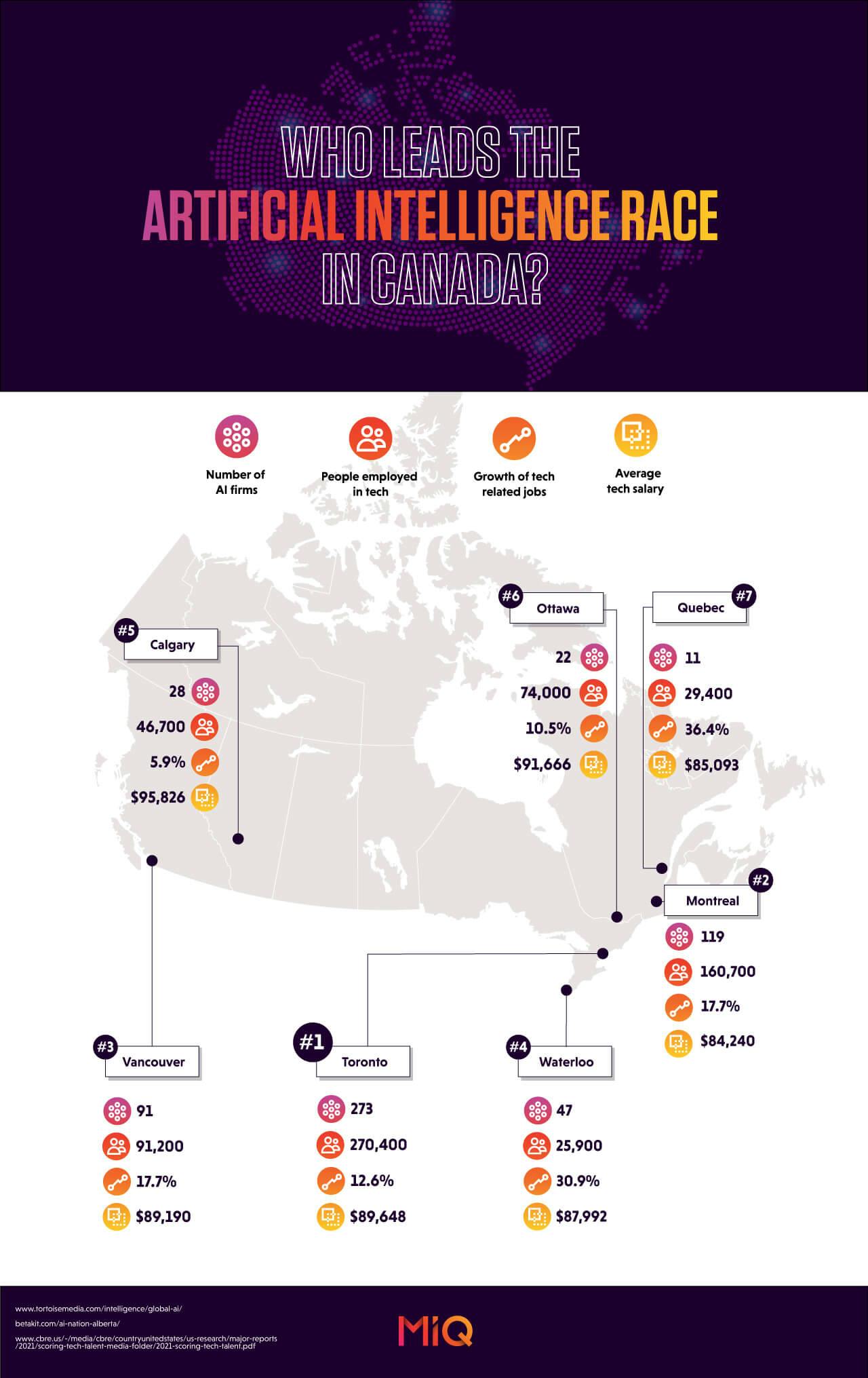
It’s no fluke that Canada has become one of the world’s leading hubs of activity for artificial intelligence companies, ranking 4th out of 62 countries for its AI ecosystem. Canada’s federal and provincial governments have invested mightily in the Canadian AI ecosystem and its future. The Canadian government’s Pan-Canadian Artificial Intelligence Strategy, the world’s first national AI strategy, spent CA$125 million accelerating Canada’s AI advancements and recruiting world-class research talent.
Ranking Canada’s AI initiatives globally
(Rankings out of 64)
Talent – 8th
- When it comes to the availability of skilled AI specialists, Canada ranks in the top 10 globally, with the US, India, Singapore and the UK taking the top spots.
Infrastructure – 16th
- Canadian AI infrastructure, including electricity, internet and supercomputing capabilities, has a way to go before competing with countries like the US, China, Singapore, Hong Kong and Ireland.
Operating environment – 20th
- Looking at data regulations, industry diversity, and public trust of AI, Canada ranks 20th, with Poland, Ireland, Saudi Arabia, and China scoring higher for their data protection regulations, diversity among tech graduates, and public support of AI.
Research – 5th
- Canada ranks high for specialist research taking place around AI. Along with the US, China, the UK and Germany, Canada has more AI labs per capita and is cited in more academic publications than other countries.
Development – 9th
- Canada ranks in the top 10 globally for the number of platforms and algorithms being developed to run AI. Along with the US, South Korea, China and Australia, the country scores highly for its R&D spend and participation in setting global standards for AI.
Government Strategy – 3rd
- Regarding government commitment to AI projects, Canada ranks 3rd globally, outpacing the US and China, but topped by the UAE and Saudi Arabia.
Commercial – 6th
- With a high concentration of startup activity and AI business initiatives, the country is among the top 10 most AI-centric nations, with the US, China, Israel and the UK ranking highest.
See the full rankings here.

Canada’s fast-growing AI hotspots
Canada has several major centres of AI expertise. Waterloo and Quebec City rank among the top 50 tech talent markets in North America, but with 273 AI firms, Toronto has the densest AI startup cluster overall.
Canada’s three AI institutes—Amii in Edmonton, Alberta province, Mila in Montreal, Quebec, and Vector Institute in the Toronto-Waterloo corridor foster AI partnerships and growth beyond their geographic areas.
Toronto
- Number of AI firms: 273
- Number of people employed in tech: 270,400
- Growth of tech-related jobs: 12.6%
- Average tech salary: $89,648
Montreal
- Number of AI firms: 119
- Number of people employed in tech: 160,700
- Growth of tech-related jobs: 17.7%
- Average tech salary: $84,240
Vancouver
- Number of AI firms: 91
- Number of people employed in tech: 91,200
- Growth of tech-related jobs: 17.7%
- Average tech salary: $89,190
Waterloo
- Number of AI firms: 47
- Number of people employed in tech: 25,900
- Growth of tech-related jobs: 30.9%
- Average tech salary: $87,992
Calgary
- Number of AI firms: 28
- Number of people employed in tech: 46,700
- Growth of tech-related jobs: 5.9%
- Average tech salary: $95,826
Ottawa
- Number of AI firms: 22
- Number of people employed in tech: 74,000
- Growth of tech-related jobs: 10.5%
- Average tech salary: $91,666
Quebec
- Number of AI firms: 11
- Number of people employed in tech: 29,400
- Growth of tech-related jobs: 36.4%
- Average tech salary: $85,093
One to watch: Given its tech talent, deep roots in machine learning, and talk of an Edmonton-Calgary tech corridor, Alberta may be positioned to become a global AI force in the next few years.
Which Industries are optimizing AI?
AI is gaining traction in industries countrywide, including fintech, advanced manufacturing, biotechnology, agri-tech, sports, and automotive fields. It’s also making inroads in healthcare, from predicting bottlenecks in hospital emergency rooms to applications in development in prevention, treatment and rehabilitation, that will allow for more rapid diagnoses and reduced costs.
AI tools like chatbots and intelligent tutors are reshaping higher education. And AI is changing the Canadian retail landscape, from revolutionizing the management of supply chains to equipping more brick-and-mortar stores in a post-pandemic world with robots that kill bacteria with ultra-violet light.


